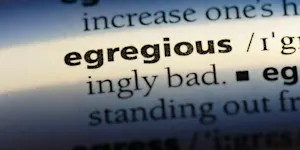What Makes This Word Tick
"Expectant" is like that tingling feeling you get when you're on the edge of your seat. It's all about anticipation, awaiting something special. Whether it's a mother-to-be eagerly preparing for the arrival of her baby or someone looking forward to a long-awaited vacation, this word captures that hopeful and excited state perfectly.
If Expectant Were a Person…
Imagine Expectant as a lively individual with wide eyes and a constant smile, always wearing clothes perfect for the weather and carrying a small notepad to jot down wishes and dreams. They thrive on the promise of the unknown and have an infectious enthusiasm that pulls everyone around them into their world of optimistic suspense.
How This Word Has Changed Over Time
Initially, "expectant" primarily referred to those waiting for children, but it has evolved to encompass broader anticipations. Today, this word paints vibrant pictures of hopeful waiting and is used in various contexts, from the medical field to everyday scenarios like expecting rain or company.
Old Sayings and Proverbs That Use Expectant
While "expectant" doesn’t prominently feature in classic proverbs, the idea of expecting something wonderful is timeless and akin to “Good things come to those who wait.” The sentiment of eagerly waiting for something positive touches on universal wisdom.
Surprising Facts About Expectant
It's quite versatile! While most people associate "expectant" with pregnancy, it’s also used in animal behavior studies. Animals can show expectant behavior when conditioned to anticipate rewards or outcomes. It’s a term that bridges human experiences and the natural world with ease.
Out and About With This Word
Next time you find yourself at a pet adoption event, observe the dogs or cats. Many of their behaviors exhibit expectant qualities, particularly as they wait by the gate, tails wagging or tails slightly twitching, ready to meet their potential forever family.
Pop Culture Moments Where Expectant Was Used
Think about classic television shows featuring surprise parties or revealed secrets, where an expectant atmosphere bubbles with tension. Expectant moments are rife in "reveal" scenes from home renovation shows to cooking competitions, capturing that collective breath-holding moment.
The Word in Literature
“Expectant” shows up in literature where suspense thrives, like in mystery novels. Authors use it to illustrate characters on the verge of discoveries or decisions, creating a palpable sense of intrigue and potential. It paints characters with a layer of depth, poised on the brink of change.
Moments in History with Expectant
During the 1969 moon landing, the world stood in expectant silence. Humanity collectively held its breath, illustrating the power this word holds. It’s not just about an individual but can describe a collective anticipation during momentous times.
This Word Around the World
In Spanish, "esperanzado" captures a similar feeling, often used for hopeful yet patient anticipation. Meanwhile, in Japanese, "期待" (kitai) combines expectation with desire, reflecting the emotional nuance of waiting with hope—a nod to how expectation transcends cultural boundaries.
Where Does It Come From?
"Expectant" traces back to the Latin word "expectantem," which means "awaiting" or "believing." The historical roots point to a time when expectation was as much belief and faith in what was to come as it was waiting itself.
How People Misuse This Word
Sometimes, people might mistake "expectant" for simply hopeful without the element of anticipation. It’s not just about wanting something; it’s about being on the cusp of something happening— a crucial nuance!
Words It’s Often Confused With
Expecting: Often used interchangeably, but "expectant" carries a sense of being poised or ready.
Hopeful: Can imply a desire without the sense of pending occurrence.
Anticipatory: Similar in context, but often used more formally or clinically.
Additional Synonyms and Antonyms
Synonyms include "anticipatory," "eager," and "hopeful." As for antonyms, you have "unconcerned," "indifferent," and "apathetic"—states quite the opposite of being on the edge of an exciting threshold.
Want to Try It Out in a Sentence?
Try this: As the day of the class reunion approached, she became increasingly expectant, imagining the faces of old friends and rekindled memories.
















